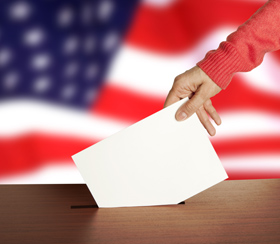Lawyers debate campaign financing, voter restrictions and other election issues

Image from Shutterstock.
Believe it or not, there are plenty of hot-button and controversial topics relating to the upcoming 2016 presidential election that have nothing to do with Donald Trump.
On Friday, panelists representing a diverse range of ideological and political views spoke at the ABA Annual Meeting in Chicago about issues ranging from campaign finance to redistricting to guaranteeing the right to vote. The panel, moderated by Oxford, Mississippi, lawyer Benjamin Griffith of the Griffith Law Firm, consisted of Federal Election Commission head Ellen Weintraub; Bickerstaff Heath Delgado Acosta partner C. Robert Heath of Austin, Texas; the American Civil Liberties Union of Florida’s director of legal operations, Nancy Abudu; the director and counsel of the Brennan Center for Justice’s Washington, D.C., office, Nicole Austin-Hillery; the president and general counsel of the Center for Equal Opportunity in Falls Church, Virginia, Roger Clegg; and the director of the Public Policy Department at the Lawyers’ Committee for Civil Rights Under Law in D.C., Tanya Clay House.
Weintraub was outspoken in her opposition to Citizens United and other U.S. Supreme Court decisions that have allowed unlimited third-party contributions into political races. “It is a challenging time in political finance,” she noted. “Based on the most recent filings, the 2016 presidential candidates have raised a total of $122 million. That’s up nearly 50 percent from this time in 2012.” She stated that the super PAC filings were due later in the day, but based on the one filing she’s seen, a group backing Jeb Bush has raised more than $100 million on its own.
“I don’t think this is a rational framework to be operating in,” said Weintraub. “It’s a challenging time for people who believe everyone deserves an equal voice, as well as for those who believe that the Supreme Court is stunningly blasé about the kind of influence that kind of money buys.” She refused to accept the current state of affairs as the new normal, pointing out that there were things the FEC could do to curb the flow of money into elections, such as enacting stronger rules on disclosure, increasing the enforcement of laws against coordination between a campaign and an independent group, and curbing the influx of foreign money. “I don’t think we should just accept this and try to adapt to this new state of affairs,” she said. “We need to push back.”
Clegg, who runs a conservative think tank, disagreed. “The Supreme Court found that limits on funding are limits on free speech, and I think they were right,” he said. Clegg also found himself at odds with several other panelists for his stance on ballot integrity and disenfranchisement of felons. “It’s a bad idea for felons to be able to vote on the day they walk out of prison,” he said. “There should be some period of time where they show that they’ve actually turned over a new leaf.” As for ballot integrity and redistricting, Clegg emphasized that “racial considerations should not be weighed” but also spoke out against attempts to resurrect Section 5 of the Voting Rights Act, emphasizing that it is important to “make sure people who are entitled to vote get to vote and that those who aren’t eligible don’t get to vote.”
Those views brought him into conflict with Abudu, Austin-Hillery and House, who argued that many of these attempts to restrict voting disproportionately impact racial minorities. Austin-Hillery, however, stated that she was heartened by the fact that many of these restrictive voting laws are being struck down by courts or not going into effect. Meanwhile, she noted that many more laws are being passed or proposed that would actually increase ballot access, such as expanding early voting. “Voting is vitally important in the U.S.,” Austin-Hillery said. “It is about having a voice. It doesn’t matter how vocal you are as an individual in this country. You can never speak as loudly as you can at the ballot box.”
• See what people are saying about the events on social media, and follow along with our full coverage of the 2015 ABA Annual Meeting.
Write a letter to the editor, share a story tip or update, or report an error.


